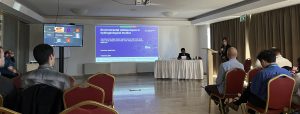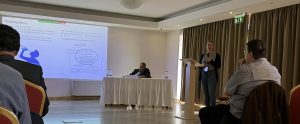This year, the scientific conference called Terrestrial Radioisotopes in Environment International Conference on Environmental Protection (TREICEP) was organized for the eighth time. The conference was hosted by Zenit Hotel Balaton in Vonyarcvashegy between 4-7 October 2022.
The aim of the conference is to make an opportunity for Hungarian and foreign experts, workgroups to meet each other and talk over different up-to-date problems and scientific challenges related to terrestrial radioisotopes. This meeting offers a chance for scientists to present their recent results and initiate collaboration in the future.
The conference was held in hybrid format. Researchers from 30 countries attended the event in person or online. Among the researchers of the József Tóth and Erzsébet Endowed Hydrogeology Chair, Anita Erőss (research fellow) and Petra Baják (PhD student) participated in the event.
Anita Erőss, as an invited speaker, gave a review presentation on radionuclides present in groundwater flow systems (Anita Erőss: Environmental radioisotopes in hydrogeological studies). In her presentation, she emphasized that by applying hydrogeological methods and the basin-scale flow system approach, explanations can be found for many phenomena, such as the uranium content of drinking water in Hungary, the high radon content of springs in the Velence Hills and the Sopron Mountains, or the high radium and radon concentrations measured in the thermal waters of Budapest. In addition to delivering this high-quality presentation, Anita also contributed to the organization of the conference as member of the scientific committee and as a section leader.

In her presentation, Petra Baják showed a Hungarian case study that is a good example for the application of hydrogeology in natural radioactivity research (Baják, P., Molnár, B., Hegedűs-Csondor, K., Jobbágy, V., Horváth, Á., Kohuth-Ötvös, V., Pelczar, K., Hult, M., Erőss, A. – Hydrogeological investigation of the natural radioactivity in the vicinity of Sopron Mountains). She talked about the investigation of natural radioactivity of groundwater in the vicinity of the Soproni Mountains. Based on her results, the high gross alpha activity measured during quality measurements in drinking water wells can be explained by the dissolved uranium content of the waters. Uranium is most likely mobilized and transported by the oxygen-rich waters flowing downward. These recharge areas and local flow systems are the most sensible for climate change and exaggerated water abstraction, which may cause both groundwater quantity and quality problems.

Many interesting talks were given at the conference about the accumulation of isotopes in soil and seawater linked to nuclear disasters, different radon measurement methods, dose estimation procedures, radioisotope accumulation processes in plants and animals, the newest developments of the application of radioisotopes in cancer treatment etc.
The attendance on the conference was supported by the National Laboratory for Climate Change RRF-2.3.1-21-2022-00014 project.


